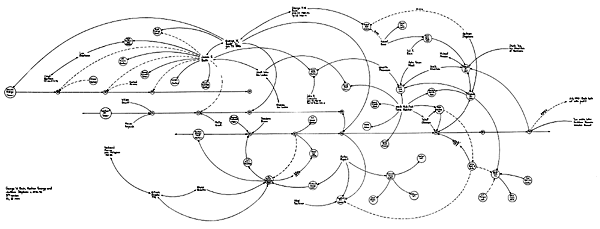Image via Elkus
[ by Charles Cameron — a comparative mapping of time and eternity? ]
.
From my POV, this image is superb:
It demonstrates both the experience of the human chess player, who cannot in general play by a “brute force” method since the tree of choices exceeds his neuronal capacity, and the rational experience of the brute force method, illuminated in the case of a problem small enough in scale for artful representation.
And part of what’s interesting — wonderful — here is the fact that the chess board is graphically far less beautiful, I dare to say, than the representation of the corresponding tree of choices.
And it reminds me of nothing so much as Mark Lombardi‘s fine art “conspiracy” graphs, like this one:
— taken from Lombardi’s book, Global Networks, in which the artist draws the networks of influence surrounding eg oil and war in the Middle East — and which I’m sure can be found with a little effort for less than the $234.63 atvwhich Amazon currently offers a used paperback copy.
**
With thanks to Adam Elkus for pointing me to this concise icon of the Garden of Forking Paths.





September 20th, 2015 at 4:13 pm
Great piece; but I disagree that the decision tree is more beautiful than the chess board. There are few things in life more beautiful than a chess board with pieces–esp. the Staunton 2-D ones, which I’ve loved since following Fischer v. Spassky in 1972 in the newspaper stories and graphics!
September 20th, 2015 at 7:33 pm
Thanks, Tim.
.
I’d agree as to chess boards, plural, that some of them can be extraordinary works of art — but of the two graphical representations, I find the tree more beautiful than the checkered board graphic — and the combination of the two even finer.